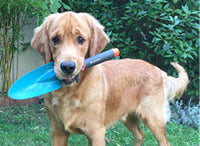As the nation gears up for National Poison Prevention Week, March 20-26, it’s a good time to educate pet parents on ways to keep your dog safe in the garden.
Toxic Plants to Avoid
It’s hard not to love spring bulb flowers – tulips, crocus and daffodils. Yet, these and some other bulb flowers, such as hyacinth and gladiola, can cause vomiting, diarrhea, depression, convulsions, drooling, and lethargy in our pooches.
The bulbs themselves are especially dangerous, as this is where most of the toxins reside. The same is true for the rhizomes part of the iris. So be careful to keep these out of reach before planting, and cover them with plenty of mulch after planting.
RELATED: Doggie Diarrhea – What Do I Do?
Other common plants flagged as harmful to dogs if ingested include many of the lilies, begonia, carnation, chamomile, chrysanthemum, clematis, coleus, geranium, hibiscus, hosta, hyacinth, hydrangea, larkspur, lavender, lily of the valley, morning glory, sweet pea and sweet William. Especially toxic are azalea, nicotiana and oleander. In addition to the disorders above, these plants may even cause kidney failure, oral ulcers, cardiac arrhythmias and even death.
These are just a few examples of harmful plants in our gardens. For a comprehensive list and photos of both toxic and pet-safe garden plants, visit the Animal Poison Control Center at www.aspca.org/pet-care/poison-control/plants.
It's More Than Just Plants
In addition to planting safe plants, there are many other elements to making your garden safe. When it comes to mulch, stay away from cocoa mulch. It contains theobromine and caffeine, which can cause vomiting, diarrhea, elevated heart rate and seizures. Use a mulch of pine or hardwood instead.
Watch what insecticides and herbicides you buy, as these can pose problems too. According to the Animal Health Foundation, research on phenoxy-type herbicides shows they increase the incidence of cancer. Nonphenoxy herbicides, such as Roundup, do not increase cancer risk.
They also recommend that you don't use slug bait that contains metaldehyde, which can be fatal to pets and wildlife. Do more research yourself on the Internet or contact your state university’s cooperative extension service for safe alternatives.
Action Steps
If you think that your animal is ill or may have ingested a poisonous substance, contact your local veterinarian or the ASPCA’s 24-hour emergency poison hotline directly at 1-888-426-4435.
If your dog develops vomiting or diarrhea and your veterinarian recommends feeding a “bland diet”, you’ll want to know about Under the Weather™ Chicken & Rice freeze dried product. It is a quick and convenient solution to shopping for the ingredients and cooking a chicken and white rice diet for your dog.
This blog is brought to you by Under the Weather™, provider of products for sick pets.
View Our Products
Visit Our Blog Library





